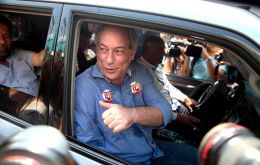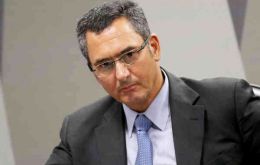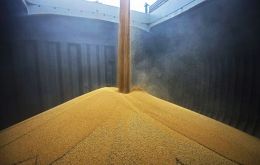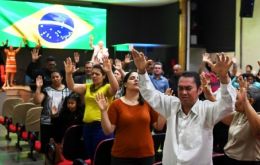MercoPress. South Atlantic News Agency
Tag: Brazil
-
Friday, September 28th 2018 - 08:58 UTC
Brazilian currency strengthens below 4 to the dollar: first time in five weeks

The Brazilian currency dipped under four Real to the dollar for the first time in five weeks at close on Thursday as the markets reacted favorably to the emergence of two clear presidential election frontrunners. The Real closed at 3.99 to the US dollar just two weeks after hitting a record low of almost 4.2 to the dollar -- it's lost around 17% since the start of the year.
-
Friday, September 28th 2018 - 08:47 UTC
Oil majors to bid for Brazil's offshore potential despite electoral uncertainty

Oil majors are set to gather in Rio de Janeiro this Friday to unveil bids for stakes in Brazil’s high potential offshore areas ahead of elections that are casting a cloud of uncertainty over the industry.
-
Friday, September 28th 2018 - 08:17 UTC
Petrobras gradually moving out of lawsuits stemming from major corruption scheme

Petrobras, Brazil's state oil company, has agreed to pay more than US$ 853m to the United States and Brazil, ending a long-running corruption investigation. The probe stemmed from a bribery scheme at the firm, which involved millions in payments that were concealed from investors and regulators.
-
Thursday, September 27th 2018 - 09:15 UTC
Ciro Gomes leaves hospital following minor prostate surgery

Brazil presidential election candidate Ciro Gomes left hospital in Sao Paulo on Wednesday, a day after undergoing surgery on his prostate. Currently running third in opinion polls ahead of the October 7 election first round, 60-year-old Gomes underwent a minimally invasive procedure that involved the “cauterization of blood vessels,” his center-left PDT party said in a statement.
-
Thursday, September 27th 2018 - 08:57 UTC
Latest poll in Brazil shows extreme right Bolsonaro losing ground

Brazil’s far-right presidential candidate Jair Bolsonaro has only a six-point lead over surging Workers Party candidate Fernando Haddad, and would lose a second-round runoff against him next month, a new opinion poll showed on Wednesday. However both leading candidates lost one percentage point over last week's poll and only Ciro Gomes climbed from 11% to 12%
-
Thursday, September 27th 2018 - 05:25 UTC
Temer tells US corporate leaders Brazil is open for business

Brazil has been clawing itself out from the worst recession in its history, but that hasn’t stopped President Michel Temer from touting the country to investors. Temer and his entourage told United States business leaders at an event leading up to the United Nations General Assembly that the country is open for business.
-
Wednesday, September 26th 2018 - 09:08 UTC
Brazil expected to import a million tons of soybeans from the US

Brazil, the world's No 1 soy exporter, is expected to import around one million tons of the oilseed in coming months from its largest global competitor, the United States, as local supplies dwindle, according to Sao Paulo-based grain trader Agribrasil.
-
Wednesday, September 26th 2018 - 08:58 UTC
Evangelical “block” in Brazilian congress expected to increase

Evangelical voters are expected to play a decisive role in Brazil’s Oct. 7 presidential election as new rules ban corporations from making direct contributions in the wake of a graft scandal. With their numbers and clout growing, and the “evangelical bloc” in Congress accounting for 15% of federal lawmakers, evangelical supporters have become the focus of leading candidates.
-
Wednesday, September 26th 2018 - 08:46 UTC
Ex wife of Bolsonaro denies death threats in legal fight over son's custody

An ex-wife of a leading Brazilian presidential candidate disputed a news report on Tuesday that she accused him of sending her a death threat amid a legal fight over their son's custody in 2011. The newspaper Folha de S.Paulo reported that Ana Cristina Valle had told Brazil's foreign office she left the country because of the threat by far-right congressman Jair Bolsonaro.
-
Tuesday, September 25th 2018 - 07:31 UTC
Brazil:Haddad closer to Bolsonaro and would beat him in the runoff, according to latest polls

Fernando Haddad, the presidential candidate for Brazil’s Workers Party (PT), is closing the gap with poll-leading far-right candidate Jair Bolsonaro for the October 7 first-round vote and would beat him in a runoff, a survey released on Monday showed.
